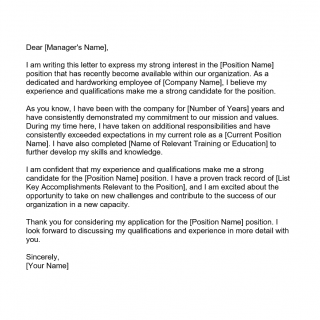Letter of Intent for Promotion
A Letter of Intent for Promotion is a formal document that outlines an employee's desire for a promotion within their current organization. The main purpose of this form is to demonstrate an individual's commitment to their current employer and their desire to advance their career within the company.
The Letter of Intent for Promotion typically consists of three main parts: an introduction, a body, and a conclusion. In the introduction, the employee should state their desire for a promotion and the position they are interested in. In the body, the employee should highlight their qualifications and accomplishments that make them a strong candidate for the position. In the conclusion, the employee should reiterate their interest in the position and express their gratitude for the opportunity.
Important fields to consider when compiling a Letter of Intent for Promotion include the employee's current position, the position they are interested in, their qualifications, and their accomplishments within the company. It is also important to include specific examples of how the employee has contributed to the company's success and how they can continue to do so in the new role.
Examples and practices of use for this form include employees who have been with a company for a significant amount of time and are ready to take on a new challenge, or employees who have recently completed additional education or training that makes them qualified for a higher-level position.
The parties involved in a Letter of Intent for Promotion are the employee and their current employer. It is important to consider the company's policies and procedures for promotions, as well as any requirements or qualifications for the position.
Letter of Intent for Promotion Sample
Dear [Manager's Name],
I am writing this letter to express my strong interest in the [Position Name] position that has recently become available within our organization. As a dedicated and hardworking employee of [Company Name], I believe my experience and qualifications make me a strong candidate for the position.
As you know, I have been with the company for [Number of Years] years and have consistently demonstrated my commitment to our mission and values. During my time here, I have taken on additional responsibilities and have consistently exceeded expectations in my current role as a [Current Position Name]. I have also completed [Name of Relevant Training or Education] to further develop my skills and knowledge.
I am confident that my experience and qualifications make me a strong candidate for the [Position Name] position. I have a proven track record of [List Key Accomplishments Relevant to the Position], and I am excited about the opportunity to take on new challenges and contribute to the success of our organization in a new capacity.
Thank you for considering my application for the [Position Name] position. I look forward to discussing my qualifications and experience in more detail with you.
Sincerely,
[Your Name]
Benefits of submitting a Letter of Intent for Promotion include demonstrating a commitment to the company, highlighting qualifications and accomplishments, and potentially advancing one's career within the organization. However, there are also risks and potential problems, such as not being selected for the position and potentially damaging one's relationship with their employer.
Related forms and alternative forms include a resume or CV, a cover letter, or a formal job application. The main difference between a Letter of Intent for Promotion and these other forms is that the Letter of Intent is specifically tailored to an internal promotion within the current organization.
The Letter of Intent for Promotion can influence the future of the participants by demonstrating their commitment and qualifications to their current employer, potentially leading to career advancement and increased opportunities within the company.
The form is typically submitted directly to the employee's supervisor or manager, and may be stored in the employee's personnel file or other HR records. It is important to follow the company's policies and procedures for submitting and storing this form.

